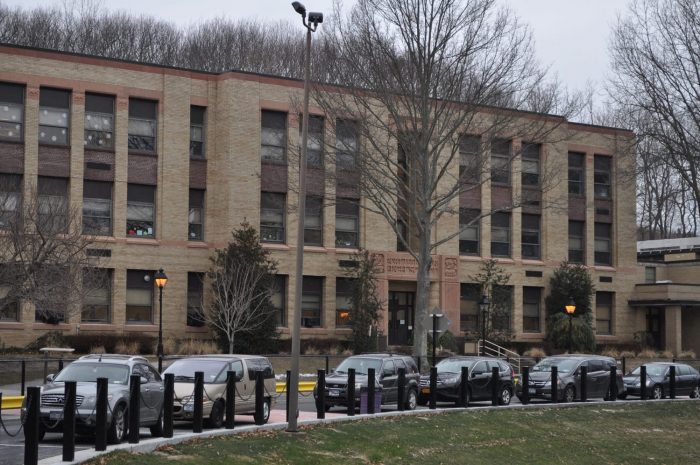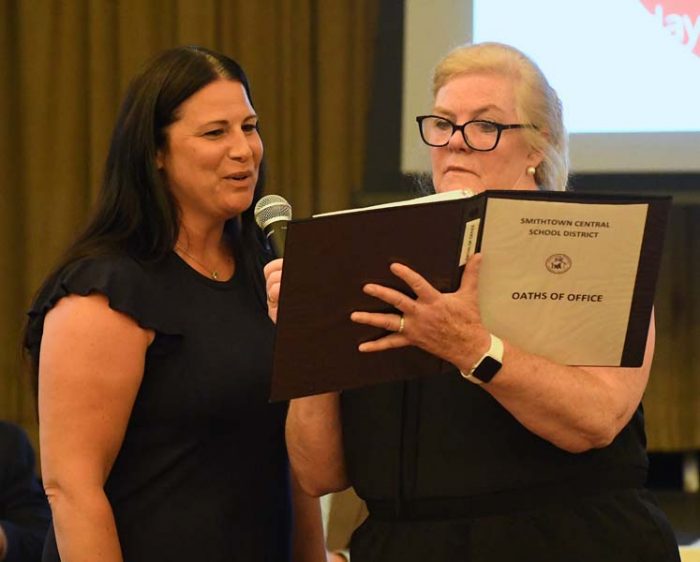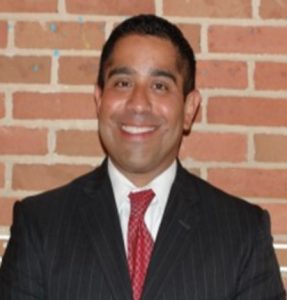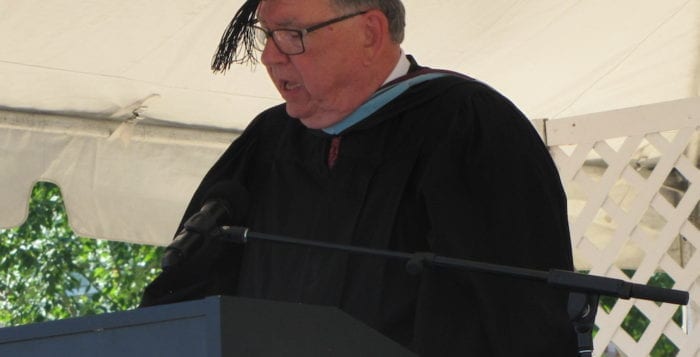By Leah Chiappino
The Smithtown Central School District Board of Education held its reorganization meeting Wednesday, July 5, with shake ups in board leadership and committee assignments.
Trustee Stacy Murphy was elected board president, and trustee Karen Wontrobski-Ricciardi was elected vice president.
Former BOE president Matthew Gribbin and trustee John Savoretti were sworn into their new terms on the board, both having won re-election. Trustee Kevin Craine, who was elected to replace outgoing trustee Jerry Martusciello, was also sworn in.
The leadership changes mark a shift in the board’s dynamic.
Board members expressed their preferences for committee assignments and the appointments were discussed. The final appointments are listed on the school’s website.
NYSSBA resolutions
The board voted on whether to support six propositions to be brought forward to the New York State School Board Association to consider implementing at its October convention.
Wontrobski-Ricciardi said Smithtown and other districts showing their support for the propositions would “carry more weight” in NYSSBA deciding to implement them.
The first proposition would have NYSSBA “oppose any legislation or budget initiatives that would allow New York State to overrule local zoning ordinances.” The rationale is in opposition to Gov. Kathy Hochul’s (D) housing plan to build 800,000 new homes in the next decade.
Catalanotto said the resolution itself would “never pass,” as it is too vague, and he can’t support it.
“We can’t dictate when the government decides to step into local zoning regulations on certain occasions, so to make it that broad and say ‘never’ doesn’t make any sense to me,” he said.
Savoretti, a realtor, said he supported the resolution to “tell the government where
we stand.”
“We can’t tell the government what to do and what not to do but they’re up in Albany, they’re not down here on Long Island,” he said. “Suffolk County is Suffolk County. It’s not a big Metropolis. … That’s why we have the town supervisor and Town Board to make those decisions for what is locally best for our community.”
Gribbin said he supported the “intent” of the resolution, but the language was too vague, and in the past they have been more expansive. Murphy said NYSSBA will develop more expansive resolutions and send them to districts to vote on based on the resolutions districts vote to support.
“It’s more about getting the rationale out there to let the state know where we as Smithtown stand on certain issues,” Wontrobski-Ricciardi said.
Crane said he would support it due to “the increased pressures of increased enrollment on budgets,” and after Catalanotto reiterated the resolution was too vague, suggested the board tweak the language.
“All seven of us are comfortable with this sentiment, but just want to clean up the language to make it stronger,” Saidens added.
The board agreed to change the language to include, “For the last two years the governor has attempted to enact policies that would give the state control over local towns and village zoning, to force construction of high-density housing plans or to allow accessory dwelling units. Forcing rapid expansion of housing would have a detrimental effect on schools, leading to overcrowding, increased class sizes and increased taxes to our residents,” and passed the resolution unanimously.
The next resolution was for NYSSBA to advocate for the reinstatement of the religious exemption to immunization. The board passed this 6-1, wth Craine voting against the measure. The third resolution stated that NYSSBA will advocate for the “adoption of Parental Rights Legislation.”
“Parents have the right to determine the upbringing of their children, which includes but is not limited to matters of education, medical care and character education,” the rationale of the resolution reads. “The legislation must protect the parents’ right to make decisions for their children in addition to opt their children out of any non-academic instruction that they morally or religiously object to.”
Saidens said he was uncomfortable with the broadness of the resolution. “It specifically targets character education, so if you’re talking about being empathetic, if you’re talking about teaching children to share, if you’re talking about if somebody is bothering somebody … there’s so many variables,” he said.
Murphy said she believed the resolution is intended so that parents could opt their children out of this kind of instruction.
Catalanotto said the resolution is unrealistic, bringing parent involvement too far into the fray.
“You’re cutting the legs out of every teacher, off of every teacher in the district,” he said. “You’re talking about group lessons, when kids get together in groups and an opportunity to teach kids how to cooperate and work together.”
He added, “When you’re dealing with kids who are arguing in class and you’re essentially saying each parent gets to choose for their child whether that’s acceptable for the teacher. It’s impossible and it would destroy a school district. You can’t operate like that.”
An educator and administrator, Saidens agreed that the resolution is not practical.
Craine, who is an elementary school teacher, also said the resolution is unrealistic. “It’s something that would be hard for an educator to teach with, especially in an elementary classroom with respect to honesty, kindness and empathy,” he said.
Craine, Gribbin and Saidens voted against the resolution while Murphy, Savoretti and Wontrobski-Ricciardi voted for it. Catalanotto, who was joining remotely, had his connection cut out.
The next resolution was to oppose “any mandates from the New York State Education Department regarding matters not pertaining to academic standards/subjects (i.e. math, science, reading, writing, social studies) that have not been approved by an up/down vote of the NYS Legislature.”
Saidens said NYSED are the experts, not elected officials, and they should be determining curriculum. Murphy said elected officials are accountable to the people, and the Department of Education officials do not have that same accountability.
The board did not pass the resolution.
The fifth resolution states that NYSSBA would advocate for “Local Control by School Boards and/or County Executives.” It passed unanimously.
The final resolution was to “oppose any legislation or NYSED regulation mandating comprehensive K-12 gender and sexuality education.” Saidens said these decisions should be left to experts.
“I think there’s conversations that are appropriate based upon age levels, and I think that if we put a room of 100 people we may have a hundred different opinions of what that may be,” he said. “The health curriculum is developed by experts in health.”
Murphy said the resolution had nothing to do with gender identity and politics but was about local control. The resolution did not pass, with Craine, Saidens and Gribbin voting against it.
If anyone is interested in getting more detailed information on what was discussed at the meeting, there is a video of the meeting on the school’s website.


















